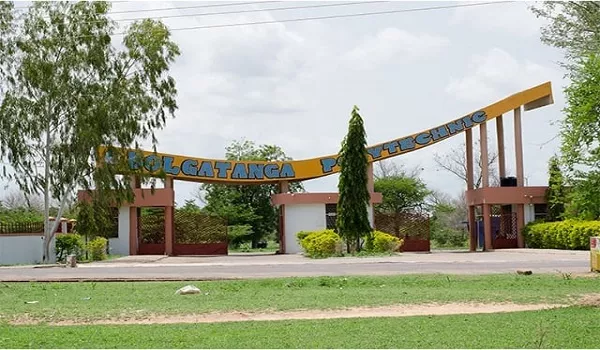In the 2021/2022 academic year, a total of 683 students were enrolled into the Bolgatanga Technical University. In the year before, 725 students were enrolled into the school. 401, 470, 457, 401 and 486 students were enrolled into the educational institution in the 2019/2020, 2018/2019, 2017/2018, 2016/2017 and 2015/2016 academic years respectively.
Male enrolment decreased from 269 in the 2015/2016 academic year to 200 in the 2017/2018 academic year while female enrolment also dipped from 217 in the 2015/2016 academic year to 201 in the 2016/2017 academic year. There has however been a consistent rise in female enrolment, rising from 226 in the 2017-2018 academic year to 240 in the 2018/2019 academic year. It can be observed that the male and female enrolment has fluctuated in the past 7-years.
In the 2022/2023 academic year, 1,208 students were enrolled into the Bolgatanga Technical University.
Professor Samuel Alnaa, the Vice Chancellor of BTU, speaking to Mark Smith on the A1 Radio’s Day Break Upper East Show explained that the increased enrolment could be attributed to the implementation of the school’s 10 year development plan.
“[As part of the implementation of the plan], we are going to increase access or enrollment. We had to undertake a vigorous campaign to ensure that we direct our second cycle graduates to TVET education,” he said.
Professor Alnaa continued to argue that TVET education at the secondary or tertiary level is not preserve of academically weak students. BTU’s outreach, Professor Alnaa said, is to cure the misconception while also increasing enrolment.
“If you look at the second cycle TVET institutions, they have been abandoned for a long. Mostly, those who we say do not have the intellectual capacity to go to the secondary schools are the ones who we push there which is wrong. Engineering requires the best brains just like in the medical fields where the best brains go there. We have our vehicles, when they are broken down, we take them to the wayside mechanics, and yet we say they are the ones who are not intelligent but we are happy and confident that they should be repairing our cars for us. Our buildings, wiring of same, they are the ones who do it and yet we say they are the ones who are not intelligent. I think we have to reverse the entire system. That is what we are doing at BTU,” he said.
Professor Alnaa gave a firm reassurance that the policy that is being implemented cannot be thrown out of the window by successive VCs.
Background
The institution was initially established as a Polytechnic in 1992 under PNDC Law 321 (1992), and thereafter converted to the status of a Technical University in April, 2020, in line with the Technical Universities Act, 2016 (Act 922), as amended. The Act, 922, mandates the University to provide higher education in Engineering, Science and Technology-based disciplines, Technical and Vocational Education and Training (TVET), Applied Arts and related disciplines, and award degrees including honorary degrees, diplomas, certificates and other qualifications agreed upon by the Governing Council Currently the University offers a number of Bachelor of Technology degree programmes, Higher National Diploma (HND) and non-tertiary programmes in TVET, business and science-related disciplines. Preparations are underway to introduce postgraduate programmes.
In order to achieve the University’s mandate as stipulated in the Act, 2016, (Act 922), as amended, the University’s Governing Council decided to develop a 10-year Strategic Plan (2023-2032) to guide the University’s medium-to-long-term growth. The purpose of the plan is to provide direction in the medium to long term for the University, by creating a conducive institutional environment for academic and entrepreneurial training. The plan provides guidelines and specific actions, timelines for relevant activities, roles and responsibilities, rresources,and the monitoring and evaluation required for success. The Strategic Plan is in two phases: 2023-2027 and 2028-2032
The methodology adopted was broad-based, open, and participatory consultation with internal and external stakeholders, such as: students, staff, employers, employees, alumni, and specialists from various areas, including community sector players. The committee also reviewed the strategic plans of other universities. The purpose was to obtain their input and buy-in for developing a stakeholder-owned document for ease of implementation, accountability, and good governance.
The Strategic Plan puts forth a key aspiration for the university to become a leading Technical University in Ghana and beyond, producing skilled, knowledgeable and employable graduates in various disciplines for industry. To realise this aspiration, the University will promote effective and quality teaching/learning research, community service and resource mobilisation.
The first phase of the Strategic plan, 2023-2027, aims at positioning the Institution to become a leading technological university while the second phase, 2028-2032, seeks to consolidate the gains made thereof. In this regard, the University has developed seven (7) strategic priority areas that seek to:
- Increase student enrolment taking into account diversity, quality and equity
- Improve infrastructure, facilities and services for teaching, learning and research
- Strengthen and improve teaching, learning, research and community service. 4. Improve Internationalisation and stakeholder collaboration (ie., university/industry/alumni)
- Strengthen ecological agriculture through research, teaching/learning, training and extension services
- Improve resource mobilisation and utilisation 7. Improve corporate governance and management systems
The implementation of these strategic priority areas should propel the University to its desired destination as a preferred tertiary institution. This requires new thinking, commitment, resource mobilisation and funding from both internal and external stakeholders.
Source: A1radioonline.com|101.1MHz|Mark Kwasi Ahumah Smith|Ghana


